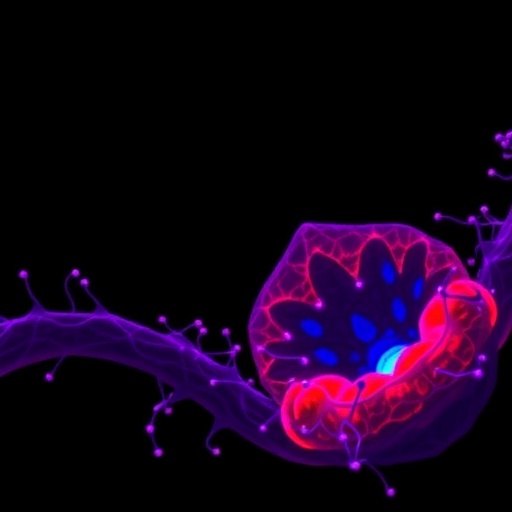
In the fight against colorectal cancer, a groundbreaking discovery reveals a novel mechanism that could change the landscape of treatment strategies and enhance therapeutic outcomes. Recent research published in the esteemed Journal of Cancer Research and Clinical Oncology highlights how the depletion of UBAP2L, a lesser-known protein, may serve as a pivotal tactic in combatting not only the proliferation of colorectal cancer cells but also their resistance to radiotherapy. This revelation poses a significant paradigm shift, offering new hope in the relentless pursuit of effective cancer treatment.
Colorectal cancer, notorious for its aggressive nature and increasing prevalence, remains a leading cause of cancer-related morbidity and mortality worldwide. Its resilience against existing therapies, particularly radiotherapy, amplifies the urgent need for innovative approaches that can overcome these barriers. The intricate mechanisms underlying cancer cell proliferation and therapeutic resistance have been the focus of intense scrutiny, with researchers striving to identify molecular targets that hold the potential for reversal of these processes.
At the heart of this new study is UBAP2L, a protein implicated in various cellular functions, including those related to cancer biology. The research team, led by prominent scientists Li, Wang, and Zhang, systematically explored the impact of UBAP2L depletion on colorectal cancer cell behavior. Their findings illuminate how this protein plays a critical role in modulating oxidative stress responses within cancer cells, particularly through its regulation of GPX4, an enzyme vital for cellular redox balance.
The researchers employed a combination of in vitro experiments, where they inhibited UBAP2L expression in colorectal cancer cell lines, and in vivo models to observe the resultant effects on cell viability and tumor growth. The results were striking; cells with diminished UBAP2L exhibited significantly reduced proliferation rates, indicating that this protein is instrumental in driving cancer cell growth. Intriguingly, these depleted cells also displayed heightened sensitivity to radiation, suggesting that targeting UBAP2L could enhance the efficacy of radiotherapy.
Further analysis revealed that the mechanism through which UBAP2L exerts its influence is closely tied to GPX4 activity. This enzyme is crucial for the detoxification of lipid peroxides, thus playing a protective role against oxidative damage. When UBAP2L levels were reduced, a marked decrease in GPX4 activity was observed, leading to an accumulation of reactive oxygen species (ROS) within the cancer cells. This increase in oxidative stress ultimately compromised cell survival, particularly under the duress of radiotherapy treatment.
The implications of these findings extend beyond basic biological understanding; they suggest a potential therapeutic pathway that could be harnessed to optimize treatment regimens for colorectal cancer patients. By targeting UBAP2L, clinicians may be able to exploit the vulnerabilities of cancer cells, enhancing their sensitivity to existing therapies while simultaneously impeding their growth. This dual approach could lead to more effective and personalized treatment strategies, addressing the critical challenge posed by therapy resistance.
As the research team notes, the future of colorectal cancer therapy could be significantly altered by these insights. The possibility of developing pharmacological agents designed to inhibit UBAP2L or enhance GPX4 activity presents an exciting avenue for exploration. Additionally, these findings may encourage further investigations into the role of UBAP2L in other cancer types, potentially broadening the scope of impact for this molecular target.
Moreover, this study underscores the importance of understanding the intricate molecular networks that govern cancer biology. As researchers continue to uncover the complexities of cancer cell behavior and their responses to treatment, the identification of new targets such as UBAP2L becomes increasingly crucial. This research aligns with the broader trend in oncology, where emphasis is placed on personalized and targeted therapy, aiming to improve patient outcomes based on the specific molecular characteristics of their tumors.
The research community will undoubtedly keep a close eye on follow-up studies that seek to validate and expand upon these findings. Investigating the consistency of UBAP2L’s role across various models and different stages of colorectal cancer will be essential for establishing robust therapeutic strategies. Furthermore, clinical trials will be needed to assess the safety and efficacy of any potential treatments derived from these discoveries, translating laboratory findings into tangible benefits for patients.
As we move forward, the integration of molecular insights into clinical practice is anticipated to be a game-changer in oncology. Collaborations between basic researchers, clinical oncologists, and pharmaceutical companies will be vital in facilitating the advancement from bench to bedside. The quest to unravel the complexities of cancer will continue to thrive, with studies like this paving the way for more innovative and effective solutions.
In summary, the depletion of UBAP2L presents a compelling new target in the ongoing battle against colorectal cancer. By elucidating its role in suppressing cancer cell proliferation and enhancing sensitivity to radiotherapy, this research opens the door to new therapeutic possibilities. The potential to improve patient outcomes through the modulation of this protein highlights the dynamic nature of cancer research and the continual evolution of treatment paradigms. As more is learned about UBAP2L and its mechanistic pathways, the horizon of colorectal cancer therapies may expand, offering renewed hope to patients and clinicians alike.
In conclusion, this study serves as a crucial reminder of the importance of fundamental research in the fight against cancer. Each discovery builds upon the last, contributing to a growing body of knowledge that ultimately seeks to improve the lives of those affected by this devastating disease. As we move into an era characterized by precision medicine, the findings related to UBAP2L will undoubtedly spark further innovations and inspire new strategies aimed at overcoming the challenges of colorectal cancer treatment.
Subject of Research: Regulation of colorectal cancer cell proliferation and radiotherapy resistance through UBAP2L and GPX4.
Article Title: Depletion of UBAP2L suppresses colorectal cancer cell proliferation and radiotherapy resistance by regulating GPX4.
Article References:
Li, Y., Wang, X., Zhang, X. et al. Depletion of UBAP2L suppresses colorectal cancer cell proliferation and radiotherapy resistance by regulating GPX4. J Cancer Res Clin Oncol 151, 214 (2025). https://doi.org/10.1007/s00432-025-06266-y
Image Credits: AI Generated
DOI: 10.1007/s00432-025-06266-y
Keywords: Colorectal cancer, UBAP2L, GPX4, radiotherapy resistance, oxidative stress, cancer proliferation, targeted therapy.
Tags: cancer biology and cellular functionscolorectal cancer cell proliferationcolorectal cancer treatment strategiesenhancing therapeutic outcomes in cancerinnovative approaches to cancer treatmentJournal of Cancer Research and Clinical Oncologynovel mechanisms in cancer researchovercoming cancer therapy resistanceparadigm shift in cancer treatment strategiesprotein targets in cancer therapyradiotherapy resistance in colorectal cancerUBAP2L deficiency in colorectal cancer




